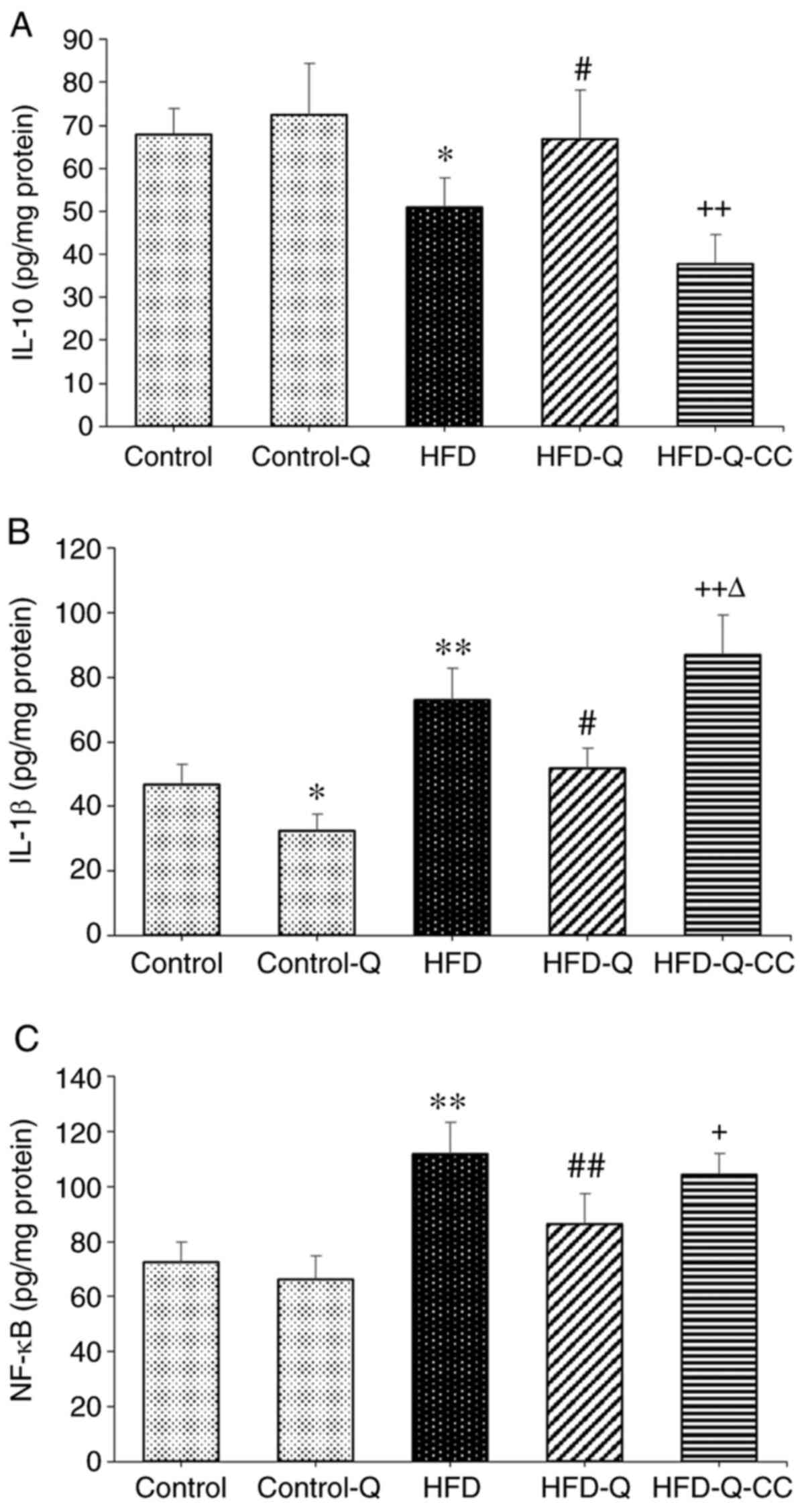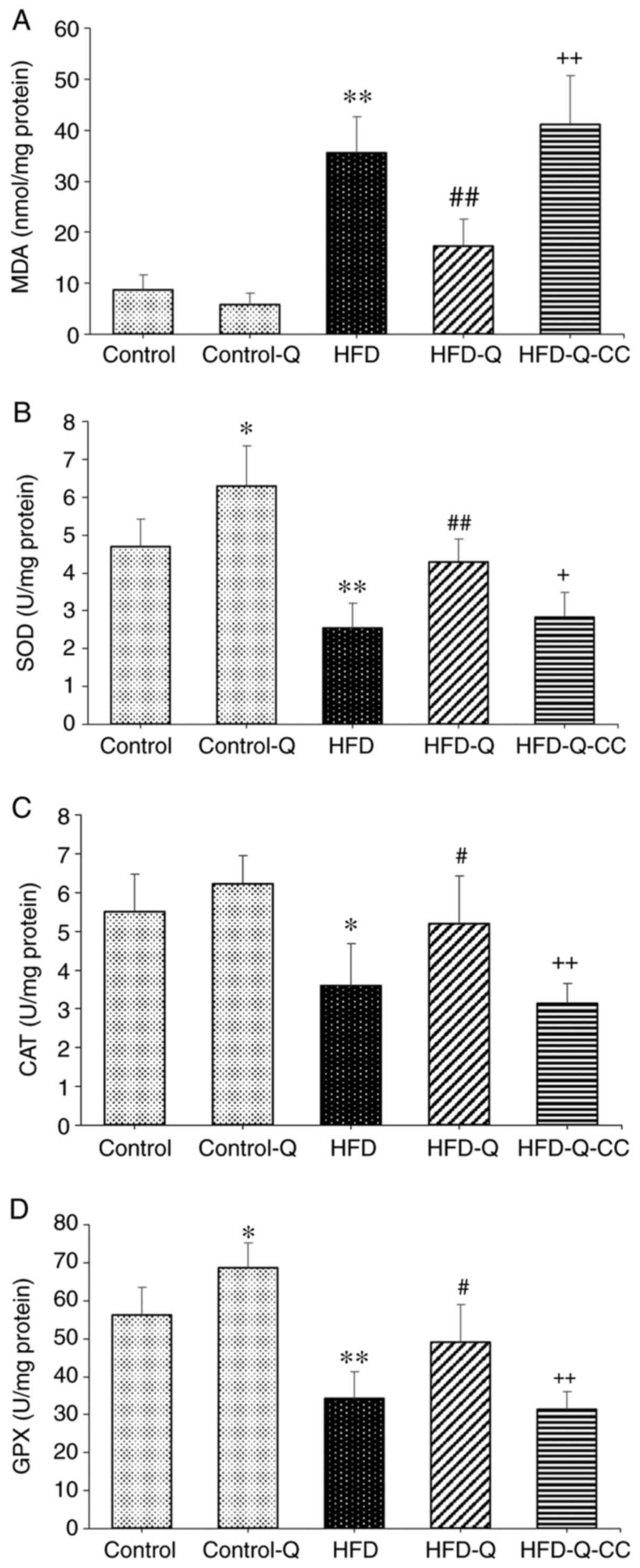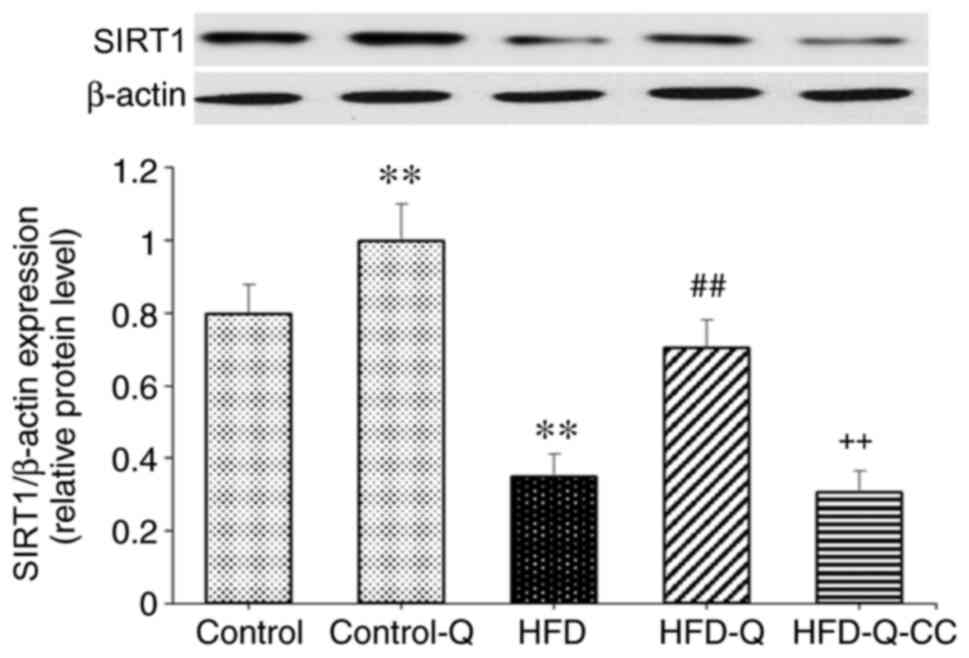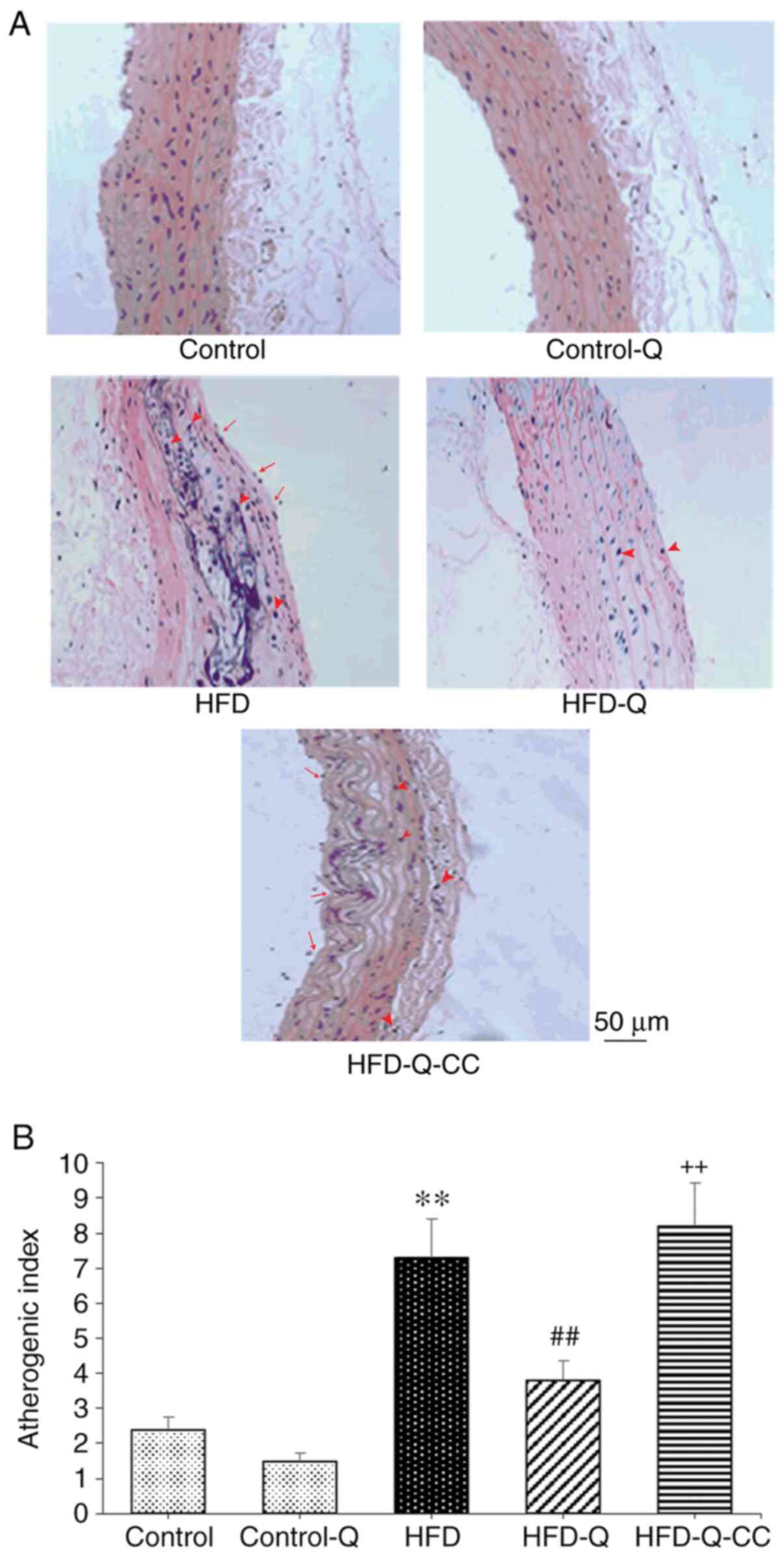|
1
|
Zhu Y, Ye P, Chen SL and Zhang DM:
Functional regulation of large conductance Ca2+-activated K+
channels in vascular diseases. Metabolism. 83:75–80.
2018.PubMed/NCBI View Article : Google Scholar
|
|
2
|
Chawla A, Chawla R and Jaggi S:
Microvasular and macrovascular complications in diabetes mellitus:
Distinct or continuum? Indian J Endocrinol Metab. 20:546–551.
2016.PubMed/NCBI View Article : Google Scholar
|
|
3
|
Kitada M, Zhang Z, Mima A and King GL:
Molecular mechanisms of diabetic vascular complications. J Diabetes
Investig. 1:77–89. 2010.PubMed/NCBI View Article : Google Scholar
|
|
4
|
Saeid F, Aniseh J, Reza B and Manouchehr
VS: Signaling mediators modulated by cardioprotective interventions
in healthy and diabetic myocardium with ischaemia-reperfusion
injury. Eur J Prev Cardiol. 25:1463–1481. 2018.PubMed/NCBI View Article : Google Scholar
|
|
5
|
Yuan T, Yang T, Chen H, Fu D, Hu Y, Wang
J, Yuan Q, Yu H, Xu W and Xie X: New insights into oxidative stress
and inflammation during diabetes mellitus-accelerated
atherosclerosis. Redox Biol. 20:247–260. 2019.PubMed/NCBI View Article : Google Scholar
|
|
6
|
Almabrouk TA, Ewart MA, Salt IP and
Kennedy S: Perivascular fat, AMP-activated protein kinase and
vascular diseases. Br J Pharmacol. 171:595–617. 2014.PubMed/NCBI View Article : Google Scholar
|
|
7
|
Mottillo EP, Desjardins EM, Crane JD,
Smith BK, Green AE, Ducommun S, Henriksen TI, Rebalka IA, Razi A,
Sakamoto K, et al: Lack of adipocyte AMPK exacerbates insulin
resistance and hepatic steatosis through brown and beige adipose
tissue function. Cell Metab. 24:118–129. 2016.PubMed/NCBI View Article : Google Scholar
|
|
8
|
Gauthier MS, O'Brien EL, Bigornia S, Mott
M, Cacicedo JM, Xu XJ, Gokce N, Apovian C and Ruderman N: Decreased
AMP-activated protein kinase activity is associated with increased
inflammation in visceral adipose tissue and with whole-body insulin
resistance in morbidly obese humans. Biochem Biophys Res Commun.
404:382–387. 2011.PubMed/NCBI View Article : Google Scholar
|
|
9
|
Chen B, Li J and Zhu H: AMP-activated
protein kinase attenuates oxLDL uptake in macrophages through
PP2A/NF-κB/LOX-1 pathway. Vascul Pharmacol. 85:1–10.
2016.PubMed/NCBI View Article : Google Scholar
|
|
10
|
Matsuzaki T, Matsushita T, Takayama K,
Matsumoto T, Nishida K, Kuroda R and Kurosaka M: Disruption of
Sirt1 in chondrocytes causes accelerated progression of
osteoarthritis under mechanical stress and during ageing in mice.
Ann Rheum Dis. 73:1397–1404. 2014.PubMed/NCBI View Article : Google Scholar
|
|
11
|
Kume S, Uzu T, Kashiwagi A and Koya D:
SIRT1, a calorie restriction mimetic, in a new therapeutic approach
for type 2 diabetes mellitus and diabetic vascular complications.
Endocr Metab Immune Disord Drug Targets. 10:16–24. 2010.PubMed/NCBI View Article : Google Scholar
|
|
12
|
Xiao L, Liu L, Guo X, Zhang S, Wang J,
Zhou F, Liu L, Tang Y and Yao P: Quercetin attenuates high fat
diet-induced atherosclerosis in apolipoprotein E knockout mice: A
critical role of NADPH oxidase. Food Chem Toxicol. 105:22–33.
2017.PubMed/NCBI View Article : Google Scholar
|
|
13
|
Kobori M, Takahashi Y, Sakurai M, Akimoto
Y, Tsushida T, Oike H and Ippoushi K: Quercetin suppresses immune
cell accumulation and improves mitochondrial gene expression in
adipose tissue of diet-induced obese mice. Mol Nutr Food Res.
60:300–312. 2016.PubMed/NCBI View Article : Google Scholar
|
|
14
|
Egert S, Bosy-Westphal A, Seiberl J,
Kürbitz C, Settler U, Plachta-Danielzik S, Wagner AE, Frank J,
Schrezenmeir J, Rimbach G, et al: Quercetin reduces systolic blood
pressure and plasma oxidised low-density lipoprotein concentrations
in overweight subjects with a high-cardiovascular disease risk
phenotype: A double-blinded, placebo-controlled cross-over study.
Br J Nutr. 102:1065–1074. 2009.PubMed/NCBI View Article : Google Scholar
|
|
15
|
Pfeuffer M, Auinger A, Bley U,
Kraus-Stojanowic I, Laue C, Winkler P, Rüfer C, Frank J,
Bösch-Saadatmandi C, Rimbach G and Schrezenmeir J: Effect of
quercetin on traits of the metabolic syndrome, endothelial function
and inflammation in men with different APOE isoforms. Nutr Metab
Cardiovasc Dis. 23:403–409. 2013.PubMed/NCBI View Article : Google Scholar
|
|
16
|
Cao H, Jia Q, Shen D, Yan L, Chen C and
Xing S: Quercetin has a protective effect on atherosclerosis via
enhancement of autophagy in ApoE-/-mice. Exp Ther Med.
18:2451–2458. 2019.PubMed/NCBI View Article : Google Scholar
|
|
17
|
Omar HM, Almaeen AH, Elghaffar SKA, Ragab
SM, El-Metwally TH and Ahmed EA: Atherosclerotic rat model after a
high-fat, high-sucrose diet: Protective role of quercetin,
O-coumaric, and berberine. Anal Quant Cytol Histol. 40:76–84.
2018.
|
|
18
|
Feng K, Chen Z, Pengcheng L, Zhang S and
Wang X: Quercetin attenuates oxidative stress-induced apoptosis via
SIRT1/AMPK-mediated inhibition of ER stress in rat chondrocytes and
prevents the progression of osteoarthritis in a rat model. J Cell
Physiol. 234:18192–18205. 2019.PubMed/NCBI View Article : Google Scholar
|
|
19
|
Peng J, Li Q, Li K, Zhu L, Lin X, Lin X,
Shen Q, Li G and Xie X: Quercetin improves glucose and lipid
metabolism of diabetic rats: Involvement of Akt signaling and
SIRT1. J Diabetes Res. 2017(3417306)2017.PubMed/NCBI View Article : Google Scholar
|
|
20
|
National Research Council (US) Institute
for Laboratory Animal Research: Guide for the Care and Use of
Laboratory Animals. National Academies Press (US), Washington, DC,
1996.
|
|
21
|
Kim YM, Kim MY, Kim HJ, Roh GS, Ko GH, Seo
HG, Lee JH and Chang KC: Compound C independent of AMPK inhibits
ICAM-1 and VCAM-1 expression in inflammatory stimulants-activated
endothelial cells in vitro and in vivo. Atherosclerosis. 219:57–64.
2011.PubMed/NCBI View Article : Google Scholar
|
|
22
|
Hasanvand A, Amini-Khoei H, Hadian MR,
Abdollahi A, Tavangar SM, Dehpour AR, Semiei E and Mehr SE:
Anti-inflammatory effect of AMPK signaling pathway in rat model of
diabetic neuropathy. Inflammopharmacology. 24:207–219.
2016.PubMed/NCBI View Article : Google Scholar
|
|
23
|
Bayrami G, Karimi P, Agha-Hosseini F,
Feyzizadeh S and Badalzadeh R: Effect of ischemic postconditioning
on myocardial function and infarct size following reperfusion
injury in diabetic rats pretreated with vildagliptin. J Cardiovasc
Pharmacol Ther. 23:174–183. 2018.PubMed/NCBI View Article : Google Scholar
|
|
24
|
Aebi H: Catalase in vitro. Methods
Enzymol. 105:121–126. 1984.PubMed/NCBI View Article : Google Scholar
|
|
25
|
Ohkawa H, Ohishi N and Yagi K: Assay for
lipid peroxides in animal tissues by thiobarbituric acid reaction.
Anal Biochem. 95:351–358. 1979.PubMed/NCBI View Article : Google Scholar
|
|
26
|
Pham-Huy LA, He H and Pham-Huy C: Free
radicals, antioxidants in disease and health. Int J Biomed Sci.
4:89–96. 2008.PubMed/NCBI
|
|
27
|
Bigagli E and Lodovici M: Circulating
oxidative stress biomarkers in clinical studies on type 2 diabetes
and its complications. Oxid Med Cell Longev.
2019(5953685)2019.PubMed/NCBI View Article : Google Scholar
|
|
28
|
Asmat U, Abad K and Ismail K: Diabetes
mellitus and oxidative stress-A concise review. Saudi Pharm J.
24:547–553. 2016.PubMed/NCBI View Article : Google Scholar
|
|
29
|
Oguntibeju O: Type 2 diabetes mellitus,
oxidative stress and inflammation: Examining the links. Int J
Physiol Pathophysiol Pharmacol. 11:45–63. 2019.PubMed/NCBI
|
|
30
|
Najafi M, Noroozi E, Javadi A and
Badalzadeh R: Anti-arrhythmogenic and anti-inflammatory effects of
troxerutin in ischemia/reperfusion injury of diabetic myocardium.
Biomed Pharmacother. 102:385–391. 2018.PubMed/NCBI View Article : Google Scholar
|
|
31
|
Becatti M, Mannucci A, Taddei N and
Fiorillo C: Oxidative stress and inflammation: New molecular
targets for cardiovascular diseases. Intern Emerg Med. 13:647–649.
2018.PubMed/NCBI View Article : Google Scholar
|
|
32
|
Bule M, Abdurahman A, Nikfar S, Abdollahi
M and Amini M: Antidiabetic effect of quercetin: A systematic
review and meta-analysis of animal studies. Food Chem Toxicol.
125:494–502. 2019.PubMed/NCBI View Article : Google Scholar
|
|
33
|
Yao Z, Gu Y, Zhang Q, Liu L, Meng G, Wu H,
Xia Y, Bao X, Shi H, Sun S, et al: Estimated daily quercetin intake
and association with the prevalence of type 2 diabetes mellitus in
Chinese adults. Eur J Nutr. 58:819–830. 2019.PubMed/NCBI View Article : Google Scholar
|
|
34
|
Xu D, Hu MJ, Wang YQ and Cui YL:
Antioxidant activities of quercetin and its complexes for medicinal
application. Molecules. 24(1123)2019.PubMed/NCBI View Article : Google Scholar
|
|
35
|
Funakoshi T, Kanzaki N, Otsuka Y, Izumo T,
Shibata H and Machida S: Quercetin inhibits adipogenesis of muscle
progenitor cells in vitro. Biochem Biophys Rep. 13:39–44.
2017.PubMed/NCBI View Article : Google Scholar
|
|
36
|
Ewart MA, Kohlhaas CF and Salt IP:
Inhibition of tumor necrosis factor alpha-stimulated monocyte
adhesion to human aortic endothelial cells by AMP-activated protein
kinase. Arterioscler Thromb Vasc Biol. 28:2255–2257.
2008.PubMed/NCBI View Article : Google Scholar
|
|
37
|
Dong Y, Zhang M, Wang S, Liang B, Zhao Z,
Liu C, Wu M, Choi HC, Lyons TJ and Zou MH: Activation of
AMP-activated protein kinase inhibits oxidized LDL-triggered
endoplasmic reticulum stress in vivo. Diabetes. 59:1386–1396.
2010.PubMed/NCBI View Article : Google Scholar
|
|
38
|
Kim SG, Kim JR and Choi HC:
Quercetin-induced AMP-activated protein kinase activation
attenuates vasoconstriction through LKB1-AMPK signaling pathway. J
Med Food. 21:146–153. 2018.PubMed/NCBI View Article : Google Scholar
|
|
39
|
Mattagajasingh I, Kim CS, Naqvi A,
Yamamori T, Hoffman TA, Jung SB, DeRicco J, Kasuno K and Irani K:
SIRT1 promotes endothelium-dependent vascular relaxation by
activating endothelial nitric oxide synthase. Proc Natl Acad Sci
USA. 104:14855–14860. 2007.PubMed/NCBI View Article : Google Scholar
|
|
40
|
Guo H, Chen Y, Liao L and Wu W:
Resveratrol protects HUVECs from oxidized-LDL induced oxidative
damage by autophagy upregulation via the AMPK/SIRT1 pathway.
Cardiovasc Drugs Ther. 27:189–198. 2013.PubMed/NCBI View Article : Google Scholar
|
|
41
|
Chen S, Jiang H, Wu X and Fang J:
Therapeutic effects of quercetin on inflammation, obesity, and type
2 diabetes. Mediators Inflamm. 2016(9340637)2016.PubMed/NCBI View Article : Google Scholar
|
|
42
|
Herzig S and Shaw RJ: AMPK: Guardian of
metabolism and mitochondrial homeostasis. Nat Rev Mol Cell Biol.
19:121–135. 2018.PubMed/NCBI View Article : Google Scholar
|


















